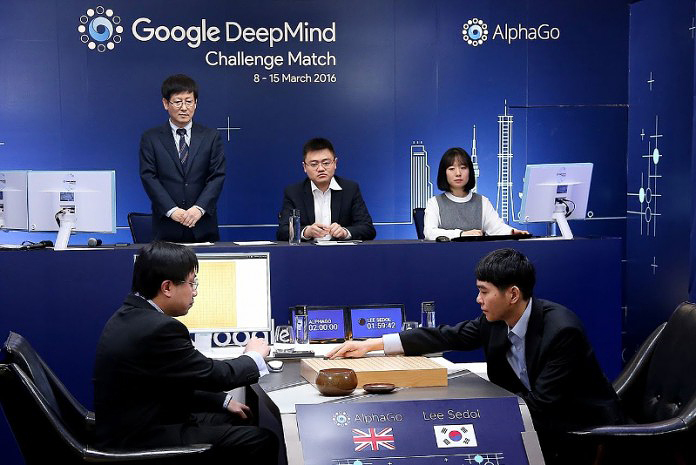Experts: Human intellect still superior to AI for now

Lee Sedol battles against AlphaGo in the second game of the best-of-five series at the Four Seasons Hotel in Seoul, South Korea, on March 10, 2016.
LONDON—Following the victory of Google’s AlphaGo over South Korean Go grandmaster Lee Sedol, Google CEO Sundar Pichai visited the academy of professional Go player Nie Weiping on March 31, contributing to the ongoing dialogue about the future of artificial intelligence.
“AlphaGo’s victory against Lee Sedol is a big step in the history of AI,” said Thomas Rid, a professor of security studies at King’s College London. The machine could not win through cold calculations. It had to adapt and deploy a strategy, so it was a very impressive win, he added.
Nick Bostrom, director of the Future of Humanity Institute at Oxford Martin School, said that AlphaGo is more interesting than Deep Blue because the algorithms it uses have the potential for broader applications.
Rid acknowledged the limits of programming, saying that simple human tasks, such as speaking, walking up a staircase and folding shirts remain a huge challenge for computers.
“The most advanced AI system today has the intelligence of my grandmother’s fridge: Zero,” said Luciano Floridi, a professor of philosophy and ethics of information at the Oxford Internet Institute.
There has been no breakthrough in terms of true intelligence, but it shows that AI is becoming increasingly successful at solving problems that would require intelligence if tackled by humans, Floridi said.
Nevertheless, Bostrom warned that over a long enough timescale, the development of AI equaling or surpassing human intelligence seems likely.
“What we need is to educate humanity to use such powerful technologies wisely. They may be no more or less dangerous than nuclear weapons,” said Floridi.
To safeguard against potential risks posed by AI, humanity needs to invest in basic research to develop techniques for controlling advanced artificial agents and aligning them with human values, Bostrom said.
Rid said to stop expecting that mankind will be able to create enhanced versions of ourselves. People simply improve the instruments and create better tools to do what people tell them to do, he added.
Jiang Hong is a reporter at the Chinese Social Sciences Today.
